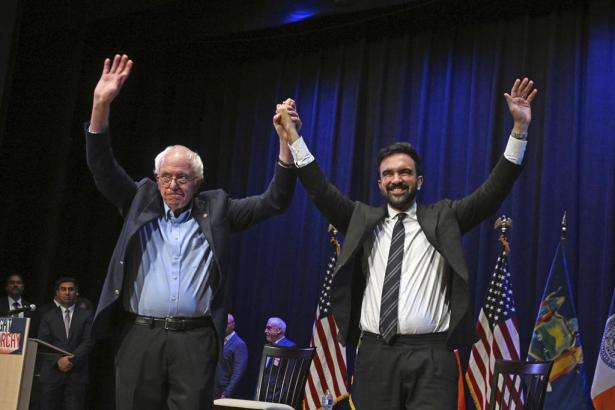Lately, the gap between what rank-and-file Democrats believe and what many leading Democratic officials say and do has widened to Grand Canyon dimensions. I’ve noted previously that while just a bare 8 percent of Democrats supported Israel’s war on Gaza in a July Gallup poll, a substantial minority of Democratic senators voted against a Bernie Sanders resolution in August to halt our nation’s provision of offensive arms to Israel.
Now, two new polls reveal the core ideological beliefs of Democrats and those of their top leaders are similarly dissimilar. A New York Times/Siena poll released today shows that democratic socialist and Democratic mayoral nominee Zohran Mamdani leads Andrew Cuomo in New York’s mayoral race by a 46 percent to 24 percent margin, with Republican Curtis Sliwa and incumbent Eric Adams bringing up the rear.
On a more fundamental, what-do-you-believe, who-are-you level, a Gallup poll yesterday shows that nationally, the percentage of Democrats who view socialism positively—66 percent—exceeds the percentage who view capitalism positively—42 percent—by (using my powers of subtraction) a 24 percentage point margin. At a less theoretical level where the rubber meets the road, the Times/Siena poll of New Yorkers showed that 37 percent of them (not just the Democrats) said having a democratic socialist for their mayor would be good for the city, against 32 percent who said it would be bad and 26 percent who said it would be neither good nor bad. As well, the specifics of Mamdani’s “affordability” agenda’s social democratic policies polled considerably higher than his opponents’ stances.
Let’s back up a bit. From the presidency of Franklin Roosevelt through that of Lyndon Johnson, the prevailing ideology of the Democratic Party was a weak-tea version of social democracy. The Carter and Clinton presidencies marked a clear switch to neoliberalism, from which the Obama presidency never really shook itself free.
Today, in a period when wage income lags hugely behind investment income and when income inequality, consequently, continues to soar, it shouldn’t be all that surprising that a substantial majority of Democrats react more positively to democratic socialism than they do to actually existing capitalism. Yesterday’s Gallup poll also showed just 37 percent of the public, and 17 percent of Democrats, had a favorable view of big business, in sharp contrast to a Gallup poll released just 12 days ago that showed that 68 percent of the public, and 90 percent of Democrats, had a favorable view of unions.
So—by what standards, by whose standards, are Bernie Sanders, Alexandria Ocasio-Cortez, and Zohran Mamdani outliers from the Democratic mainstream? In thus far refusing to endorse Mamdani, it’s New York Gov. Kathy Hochul who’s the outlier among her fellow Democrats. I understand Mamdani’s politics would likely pose an obstacle to a Democratic candidate running in a swing district, though Dan Osborn’s showing in Nebraska’s Senate election last year shows that a progressive populist program may fare a lot better than is commonly thought, even in nominally conservative climes.
Meanwhile, however, the politics of urban Democrats are clearly the politics of, at minimum, anti-corporate, anti-bank social democracy. Yet the Democratic leaders refusing to support Mamdani seem to believe that urban Democrats should support establishment candidates who don’t share those urban Democrats’ beliefs—beliefs rooted, I should add, in the life experiences of those urban Democrats. Those leaders’ position resembles what Bertolt Brecht famously characterized as that of the East German Communist politburo when it faced a mass popular uprising: that the politburo should “dissolve the people and elect another.”
You might think that some leaders and pundits who pine for the days of the centrist Democratic Leadership Council’s repudiation of both minority rights and social democratic policies might realize that Mamdani is running on the latter, and will make social democracy the hallmark of his administration should he win. If that affronts the strategic sense and ideological faiths to which these leaders and pundits cling, they should at least ponder the question of how many political parties stay in business when they reject the politics of their base.
===


Spread the word